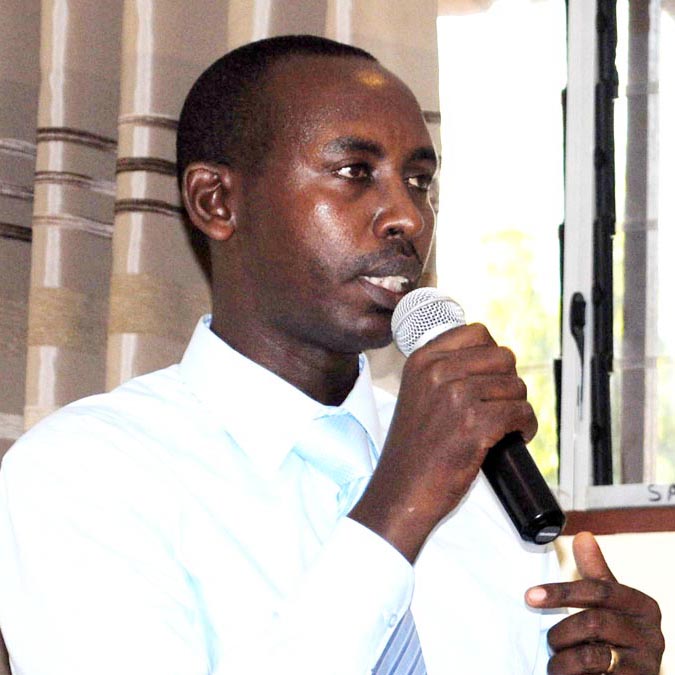The Forum for the Strengthening of Civil Society (FORSC) launched on 08th May, 2014 a new project to increase trade flows across the Burundi-Tanzania border over a period of 17 months with a financial support of TradeMark East Africa.-Diane Uwimana

Jérémie Nkunzimana, the project coordinator: “The project will facilitate the implementation of an exchange framework between traders, Immigration and OBR agents and other stakeholders from both Burundian and Tanzanian sides” ©Iwacu
“The project will facilitate the implementation of an exchange framework between traders, Immigration and OBR agents and other stakeholders from both Burundian and Tanzanian sides in order to discuss the better way to face challenges which affect the cross-border trade between both countries”, explains Jérémie Nkunzimana, the Project Coordinator. He notes that the project expects to increase the trade opportunities for both (Burundi and Tanzania) citizens, with about 10 targeted traders reporting increased access to new markets and trade in EAC. Those traders will also report an increase of at least 30% of the number of people asserting to know more about the Custom Union and the possibility of increasing commercial flows between Burundi and Tanzania.
Anthe Vrijlandt, the Country Director of TMEA mentions that the difficulties encountered by traders especially the small traders, dealing with the cross-border trade, is the main reason of this program in Burundi and other EAC partner States.
The so-called project (Increased citizen’s support for the implementation of the Protocol on the Customs Union to increase trade flows across the Burundi – Tanzanian border) will focus on the facilitation of physical access to markets, particularly in improving infrastructure and addressing the factors that contribute to the complexity and high cost of transporting along major economic corridors of East Africa. “Improving the trade environment including eliminating the non -tariff barriers and supporting reforms of trade facilitation will be led by the government institutions and EAC”, says Vrijlandt. Furthermore, she indicates that TMEA will support the competitiveness of enterprises through project partnerships with private sector organizations, civil society and media.
“Challenges are still observed”
This project followed another one conducted last year on the impact of the global integration of Burundi inside the community. “The first phase of the project revealed that cross-border traders faced many challenges during their businesses,” indicates the Country Director of TMEA. She goes on saying that non-tariff barriers persist and affect small traders, especially women even if TMEA is proud of the steps already achieved since Burundi has adhered to the community.
According to the survey conducted by Search for Common Ground small traders doing their businesses in Kobero and Mabanda border areas revealed that the obligation of having the Tax Identification Number is still a great problem encountered by those traders due to a long distance from where they should get it. The exchange rate is a big obstacle for them as well. “OBR evaluates its goods in dollars while the small traders run their businesses in BIF,” regrets Vrijlandt.
Then, an assessment will be conducted at the provincial level to identify successful trade opportunities and gather testimonies of launched business success stories. This will be put in a documentary to serve as a support during exchange meetings with traders from the countryside in order to highlight best practices to be encouraged and promoted in other EAC partner states.
The project will be implemented in Cankuzo, Muyinga, Makamba and Ruyigi Provinces as they are located at the Burundi-Tanzania border.
For Raymond Kamenyero, FORSC Coordinator, Burundians should change their mind and compete with EAC countries. “In Burundi, we have beautiful things to export such as sugar, natural fruit… but we do not profit from that opportunity and promote our products”. According to Audace Bizabishaka, Chairman of the Traders’ Network (SYGECO), it is important to associate traders to be more successful. “What they do for us without us is against us. We are the first beneficiaries though we encounter many problems. That is the reason why we must be included and intervened during the project initiation,” concludes Bizabishaka.














 IWACU Open Data
IWACU Open Data

